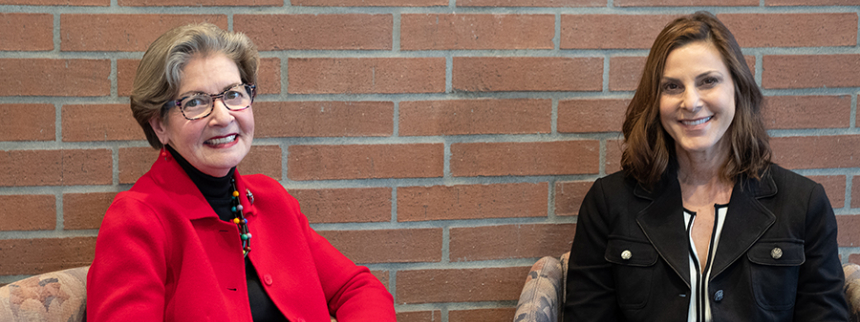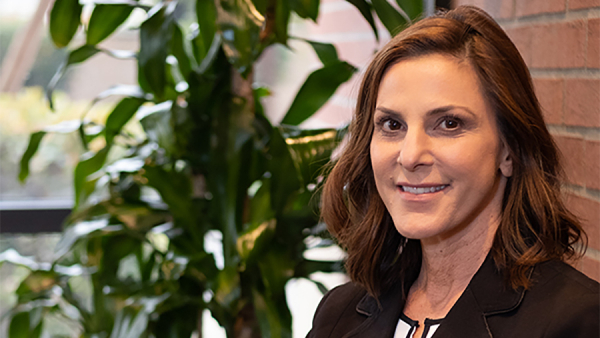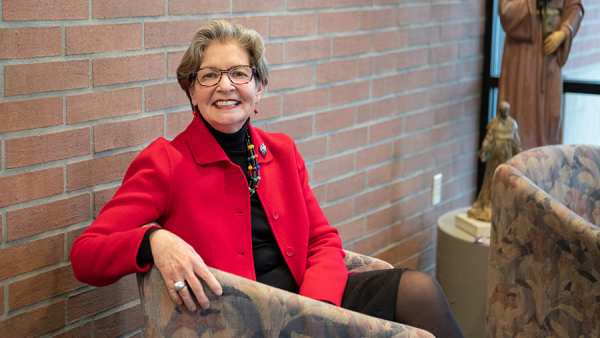
Diocesan Pastoral Council members describe their experience of advising the bishop on pastoral works by offering their views and perspectives
Janine Jorgensen, chair of the Diocesan Pastoral Council (DPC), says the six years she has served on the pastoral advisory group to Bishop Jaime Soto has been “life changing and eye opening.”
“I’ve appreciated the experience,” says Janine, a member of Saints Peter and Paul Parish in Rocklin for the past 23 years. “I now have a deeper understanding and appreciation of the role of the laity, clergy and religious in our diocese and how we can address issues together and build bridges to serve the faithful. What a gift this has been for me.”
Janine grew up in Orange County in a devout Catholic family and graduated from St. Barbara School and Mater Dei High School, both in Santa Ana. After graduating from San Diego State University, she moved to Sacramento to earn a master’s degree in social work at California State University, Sacramento. She worked for various nonprofits serving disadvantaged and disenfranchised persons, and eventually became interested in behavioral health and counseling. Today she is a clinical social worker in private practice.
Before being appointed to the DPC, she served for several years on the pastoral council at Saints Peter and Paul Parish. When she was first asked to apply for a position she was somewhat skeptical. “Our longtime pastor had retired and we had a new pastor. My initial reaction was to avoid being involved,” she recalls. “I prayed, discerned and contemplated before I pushed past my initial discomfort and accepted a position.”
“When I looked around at the seasoned faces of other members I thought, what strengths can I possibly bring to the table?” she says. She brought to the council the experiences of running a business, going through an annulment and remarriage in the church, being a mom and stepmom with children at home, and having a spouse who had converted to Catholicism. “I soon realized those very experiences formed me in a way that I knew I had something to lend and offer, that I was the voice that the council may very well need.”
The laity might ask themselves, “what is our co-responsibility with the pastor and the community members?” she says. “After I served for three years on the pastoral council, I had a better understanding of the inner workings of the parish community and all our ministries – more than I had by serving as a catechist or any other ministry I participated in. I came to understand the accountability required on both the part of the pastor, staff, ministry coordinators and the parishioners. I came to a better appreciation of the synthesizing that takes place.”
Janine will conclude her service on the DPC in 2020. Like her time on the parish pastoral council, she admits that she was more of an observer initially and reticent to speak up. “In the second year, the group dynamics changed for several of us who became members together,” she says. “I saw cohesion take place, our trust was greater, and voices were found and heard. We all became freer to share opinions and experiences.”
Bishop Soto at the DPC meetings “in his openness, said to us that we were safe to share and express our opinions, even on difficult topics,” Janine notes. “We all bring different passions and experiences to the table and I appreciate hearing all of the members’ perspectives and differing points of view.” She adds that the DPC has discussed issues such as responding to the clergy sexual abuse crisis, reinvigorating Newman Catholic Centers, racism and other issues facing the diocese and parish communities.
“Come to the Table,” the convocation of parish pastoral councils — that was to be held in mid-March in Davis and Redding but was postponed because of the Coronavirus pandemic and will be rescheduled — evolved out of discussion at the DPC that all pastoral councils “should be building a culture of consultation, trust and offered guidelines and resources.” The convocation “is a way to have pastors, parochial administrators and parish pastoral council chairs become energized and renewed. We want to be of service to all pastoral councils in addressing the issues of co-responsibility, accountability and strength.”
The theme, “Come to the Table,” is significant in a diverse diocese comprised of 20 counties of Catholic faithful in rural, urban and suburban areas. “They represent the young, middle-aged and elderly, of numerous cultures, occupations, educational level and ethnicities,” Janine says.
“For us to thrive as a local church, we have to see the face of each individual and be representative of these individuals in our parishes. We especially need to hear from younger adults and family members. We visualize laity and clergy gathering around the table and breaking bread together so to speak – a sharing of one another’s ideas, discussing what is working and open to discussing what isn’t. Gathering at the table, being fed and nourished in body and soul.”
Emilia Jankowski, a member of Sacred Heart Parish in Sacramento for the past 27 years, is also concluding six years on the DPC this year. She is chair of the pastoral council at Sacred Heart and is the city deanery representative on the DPC. She also volunteers with the monthly food collection of Sacred Heart’s St. Vincent de Paul Society ministry and is a Eucharistic minister.
What DPC members bring Bishop Soto is “an opportunity for our view from the pew,” she says. “It’s a view from our parish and our deanery, our perspective of how we view the issues. There are many different heartbeats from a parish and we bring that flavor to him. Those views can be as diverse as the geographical footprint of our diocese and its challenges.”
Emilia retired six years ago after a 33-year career in early detection and patient services with the American Cancer Society. Born and raised in San Francisco, she is a graduate of St. Brendan School and the former St. Rose Academy, and holds a bachelor’s degree in health science from California State University-Chico.
“We have an extremely diverse diocese and the territory I worked for the American Cancer Society almost mirrors the geography of the diocese,” Emilia notes. “I have great empathy for the issues Bishop Soto faces. I can’t say I know exactly all the same issues he deals with, but I know the challenges of serving people in Northern California with access to health care and access to care for someone who’s been diagnosed with cancer.
“In the same way, the challenges are there for people who want to participate in their faith but may live in a very rural area. How do you establish and maintain parishes and missions, how do you have enough priests to minister, how do you have enough parishioners in ministries, and how do we have enough volunteers to provide services?”
She cites the significant pastoral issues discussed at the DPC, including jail and prison ministry, the Whole Person Care Initiative, pastoral care for victims of clergy sexual abuse and safe environment efforts, and encouraging more laity to participate in the state’s Catholic Legislative Network. “The DPC members have a commonality, yet we all feel free to express our own views. I try as best as I possibly can to be thoughtful and to express my thoughts in a neutral way,” Emilia says.
She is one of three DPC members who spearheaded the planning of the “Come to the Table” convocation, which included input from a questionnaire to parish pastoral councils in each of the 12 deaneries of the diocese.
“Part of the convocation is to talk to pastoral councils about the working relationship between the pastor and the council members and how to work in harmony,” she notes. “A lot of people on pastoral councils come in with the idea that they have past experience on boards and committees, but this is a different type of council, so there needs to be that understanding. We are a consultative body to the pastor, and the council is pastoral in nature, not administrative.”
The pastor assimilates the information from as many different parishioners’ views as he can acquire from the pastoral council, “to then come to a final decision in time about moving forward on a particular issue or ministry,” Emilia adds. “That doesn’t mean that over time that decision may not change, but it’s basically the pastor’s opportunity to get views from parishioners, and not to allow one particular thought or conversation dominate an issue.”
Emilia says serving on the DPC has been a rewarding and enlightening experience. “I’ve learned a lot and I hope I’ve contributed a bit,” she says. “It’s been very interesting for me, because I’m hearing the perspectives of other Catholics in the diocese whom I probably would not ever have been in contact with. I wouldn’t have heard their voices otherwise, so I’m richer for the experience.”
What is the Diocesan Pastoral Council?
The Diocesan Pastoral Council (DPC) is one of three primary advisory bodies to Bishop Jaime Soto, along with the Diocesan Finance Council and the Presbyteral (Priests) Council.
The DPC has 21 members. Its mission, under the authority of the bishop, is to investigate and ponder matters pertaining to pastoral works and to propose practical recommendations concerning them, according to a directive in the church’s Code of Canon Law (no. 511).
Canon law (no. 512) also states that the DPC should include members of “the Christian faithful who are in full communion with the Catholic Church,” including laity, priests, deacons and religious.” Those appointed to the DPC “are to be so selected that the entire portion of the people of God which constitutes the diocese is truly reflected, with due regard for the diverse regions, social conditions and professions of the diocese, as well as the role which they have in the apostolate, either as individuals or in conjunction with others.”
(In header photo, Janine Jorgensen, right, and Emilia Jankowski have served on the Diocesan Pastoral Council for the past six years.)



